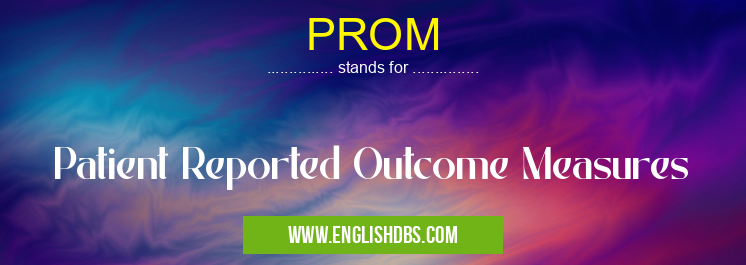What does PROM mean in PLANNING
PROM (Patient Reported Outcome Measures) refer to self-reported information provided by patients about their health status, including their symptoms, functional abilities, and quality of life. These measures play a crucial role in the evaluation and management of medical conditions in various healthcare settings.

PROM meaning in Planning in Governmental
PROM mostly used in an acronym Planning in Category Governmental that means Patient Reported Outcome Measures
Shorthand: PROM,
Full Form: Patient Reported Outcome Measures
For more information of "Patient Reported Outcome Measures", see the section below.
» Governmental » Planning
What is PROM?
PROM are quantitative or qualitative metrics that gather data directly from patients, typically through surveys or questionnaires. They assess a wide range of aspects, such as:
- Symptoms (e.g., pain, fatigue, nausea)
- Functional abilities (e.g., mobility, self-care)
- Quality of life (e.g., overall well-being, social participation)
Importance of PROM in Healthcare
PROM have gained significant importance in healthcare for several reasons:
- Patient-centered care: They provide valuable insights into the patient's perspective and experience, allowing for more personalized and patient-centered care.
- Evaluation of treatment effectiveness: PROM can track changes in patient outcomes over time, helping clinicians assess the effectiveness of treatments and interventions.
- Decision-making: PROM data informs clinical decision-making, guiding treatment plans and resource allocation.
- Research: PROM contribute to research on disease processes, patient experiences, and healthcare outcomes.
Types of PROM
PROM can be categorized into two main types:
- Generic PROM: Measure general health status and overall well-being, applicable to a wide range of patients and conditions.
- Disease-specific PROM: Assess specific aspects of health related to a particular disease or condition.
Use of PROM in GOVERNMENTAL
In the context of government healthcare programs and policies, PROM are utilized for:
- Monitoring and evaluating healthcare quality
- Setting reimbursement rates for healthcare services
- Assessing patient satisfaction
- Identifying areas for improvement in healthcare delivery
Conclusion
PROM are essential tools in healthcare that empower patients to share their experiences and contribute to their own care. By providing valuable information about patient outcomes, PROM enhance clinical decision-making, facilitate personalized care, and support research and policy development.
Essential Questions and Answers on Patient Reported Outcome Measures in "GOVERNMENTAL»PLANNING"
What are Patient Reported Outcome Measures (PROMs)?
PROMs are tools used to collect information directly from patients about their health status, quality of life, and other outcomes. They provide insights into the patient experience and help healthcare providers make better decisions about care.
Why are PROMs important?
PROMs provide valuable information that is not always captured by clinical measures. They help identify patient priorities, assess treatment effectiveness, and facilitate shared decision-making.
What types of PROMs are commonly used?
There are many different types of PROMs, each focusing on specific aspects of the patient experience. Common examples include measures of pain, physical function, mental health, and quality of life.
How are PROMs collected?
PROMs are typically administered through surveys or questionnaires. Patients are asked to provide their responses based on their own experiences and perceptions.
How are PROMs used in healthcare?
PROMs are used in various healthcare settings, including clinical research, quality improvement initiatives, and patient-centered care. They help evaluate the effectiveness of treatments, compare different healthcare interventions, and monitor patient outcomes over time.
What are the benefits of using PROMs?
PROMs provide numerous benefits, such as:
- Improved patient-provider communication
- Enhanced patient engagement in their own care
- Better understanding of the patient experience
- More accurate assessment of treatment outcomes
PROM also stands for: |
|
| All stands for PROM |
